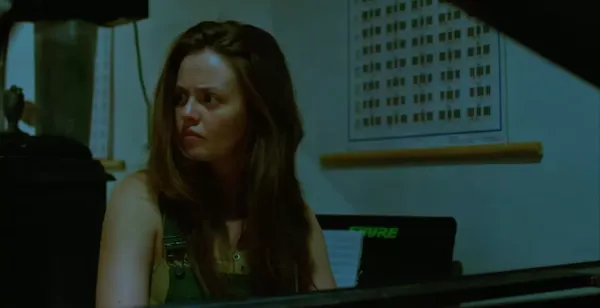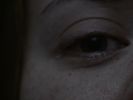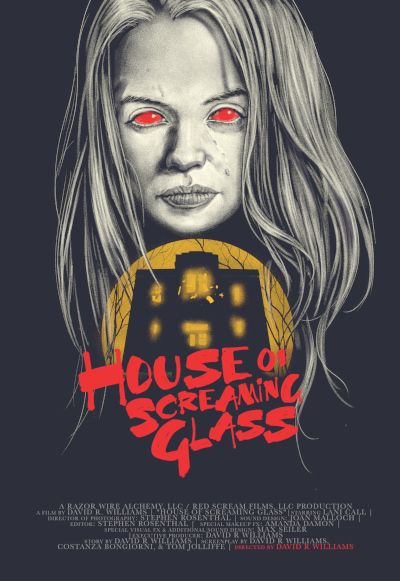Eye For Film >> Movies >> House Of Screaming Glass (2024) Film Review
House Of Screaming Glass
Reviewed by: Jennie Kermode

What, at the most basic level, makes a piece of cinema compelling? What outsiders have often recognised better than those in the industry’s powerhouses is that it’s not about having the flashiest tools or the largest cast; it’s about using what you do have well.
David R Williams’ wonderfully titled House Of Screaming Glass opens with the sound of cicadas, a slowly building weight of ambient sound behind them like the pressure one might feel in one’s ears before a storm. The image we see is partial, stained blue by what might be summer light to which our eyes are not yet accustomed. We see hair, clothing, flesh, a young woman lying on the ground, twitching in that way that bodies twitch after consciousness, or at least all possibility of survival, is gone. Panning up, we see a red doorway, the remnants of festive lights around it; part of a sign which might read ‘Cadosia School’, and above it a window. At the window, what appears to be the face of a girl. She looks down, unmoved. All of this is captured with such matter-of-factness, such effortless authority that many viewers will instantly find themselves hooked.

“My name is Elizabeth Cadozia,” comes the narration then, in that flat tone popular in the 1970s. “When I was 27 my mother died and I inherited my grandmother’s schoolhouse.”
Is Elizabeth Cadozia the body on the ground? Is she the girl at the window? Is she both? Williams somehow creates uncertainty despite the fact that he is working with a cast of one. Lani Call is magnificent, her approach so pared down and free of egotism that it’s easy to think of her character as rational until her journey has taken her to a point where it’s hard to turn back. We can see within her the lonely child whose troubled relationship with her mother led to a lifetime of uncertainty and self reproach, just as we can see the eager would-be detective excited by the discovery of old family secrets, and the rational adult woman trying to take stock of all this, to work out how she can integrate it into her life.
It will be good for her to be there, she has decided, somewhere along the way, as if she has decided on a long term relocation even before seeing it. She has been looking for somewhere quieter; she finds complete isolation. She has been seeking a more gently paced environment; she introduces us to it with a speeded-up, impressionistic tour. Slower scenes follow. A sojourn at the piano. her mother taught her to play. As she does so, something seems to approach her from behind, barely perceptible at first, in the shadows. When do those few emergent notes of colour and shape take on meaning enough to become a presence? If one sees it and another doesn’t, how to we decide if it’s there? Shaken, Elizabeth will take a pill. The world will settle. Whose eyes are we watching this through? Is she the camera as well?
Is she mentally ill – the heir, perhaps, to a schizoid illness – or is there more to the world we discover there? It’s not so much that Williams keeps us guessing as that he blurs the boundaries. If one reads older esoteric lore one might easily decide that demons, spirits – call them what you will – are one and the same thing as dangerous ideas. There is an ancient concern with keeping the mind on the straight and narrow, partly with a view to protection but also to maintain certain power structures, particularly patriarchy. Finding nude photographs in an unexpected place, Elizabeth marvels at the confidence of this woman, apparently her grandmother – at how comfortable she is in her flesh.
There are many different kinds of photographs here. Some – even one of a baby – have their eyes or faces scribbled over or scratched out. There are drawings, too, seemingly made by a child. Cats, dogs, something that is perhaps a dinosaur...perhaps not. In due course we will get to body horror. Elizabeth is aesthetically drawn to the appearance of her own blood, and self harms accordingly. She drinks liberally from glass bottles wreathed in tentacles, and we enter a world in which hallucination is added to the litany of possible visual and psychological interpretations. The film takes on sensual and erotic overtones, there is a good deal of what could be seminal fluid or ectoplasm, and, at the bottom of a box, something which strongly resembles one of The Evil Dead’s necronomicons, let more grotesquely rendered.
Stylistically, this is the most challenging element of the film. The juxtaposition doesn’t quite work, and yet its very oddness signals that we have now crossed over into a different interior space. One might delight in how lovingly the arcane style of the documents has been rendered, or the playful way in which Williams layers them onto the screen, onto Elizabeth’s parchment-coloured skin. Warmly lit pages contrast with the dullness of the schoolhouse to create a sense of exuberance, of fun. Williams isn’t just trying to scare or shock us with this thing. His film is a seduction. Will Elizabeth remember herself before it is too late? Does she care for herself enough to break free, to find an identity of her own?
A lovingly made entry in the tradition of feminine psycho-horror, House Of Screaming Glass pits a stubbornly lifeless vérité against the allure of the Gothic. Form and narrative interweave just as its heroine’s identity interweaves with that of the house: the interior, the shadow, the left hand path. Her eventual fate might look very different from different perspectives. Where she struggles to find voice, the music speaks, the melody all the more resonant because it has been played before.
Reviewed on: 19 May 2024
















